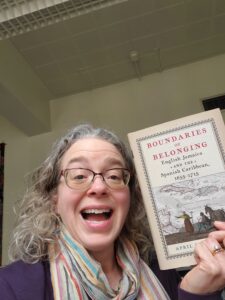Illuminating Humanities: April Lee Hatfield
Highlighting Humanities Research and its Impact
April Lee Hatfield | History
by Jennifer Wells '10

Dr. April Lee Hatfield, Associate Professor, Department of History, Texas A&M
The Glasscock Center is excited to continue its series which highlights humanities research at Texas A&M, and the vital role played by the humanities at the university and in the world beyond the academy.
For this highlight, we invite Dr. April Lee Hatfield, to tell us about her Internal Faculty Fellowship and co-convenorship of a Working Group supported by the Glasscock Center.
Dr. April Lee Hatfield is an Associate Professor in the History Department at Texas A&M University. Her latest manuscript, Boundaries of Belonging: English Jamaica and the Spanish Caribbean, 1655–1715 (available here), maps out how various individuals in the Caribbean sought belonging within its shifting and contested borders.
The Glasscock Center has been instrumental in supporting Dr. Hatfield's book. In 2009, Dr. Hatfield received an Internal Faculty Fellowship. She reflects that the semester-long fellowship afforded her the "time and space to think about how I wanted to set up this project in its early stages." Her connection with the Center continued, and in 2018, Dr. Hatfield presented her project's conclusions at its annual Land Sea Space symposium.
Dr. Hatfield has also co-convened the Caribbean and Atlantic Studies (CAST) Working Group since 2017. Along with 20 other Center-sponsored Humanities Working Groups, CAST invites both professors and students to come together and discuss research-related paper proposals, practice for upcoming conferences, workshop articles, and more. Dr. Hatfield remarks, "CAST has for many years served as a really helpful community where I could try out my ideas as I developed them and present initial drafts of research."
For scholars, Working Groups like CAST are indispensable. While it's a common misconception that academics work alone–plugging away at their keyboards day and night, only rising on occasion to drop Yoda-esque insights on the rest of us–research that truly satisfies is collaborative. It is born from rigorous seminar discussions, refined in conferences, subjected to peer review and critique, and polished during revision. Even after publication, research continues to evolve as readers engage with it, countering or building on its claims.
Dr. Hatfield's compelling narrative encourages us to move beyond accounts that limit the development of American political identities to the Age of Revolutions (1775-1848). She explains "definitions of citizenship" in the new nations that emerged from independence wars had "roots in the colonial period" and, in particular, the "clashes that happened in the Caribbean."
With its colliding polities and peoples, studying the Caribbean during the colonial period offers crucial insight into understanding questions regarding subjecthood, the colonial precursor of citizenship. What did it mean to be a subject of the British Empire or a vassal of the Spanish Crown? Who participated? And what protections, if any, did monarchs guarantee? Dr. Hatfield's research demonstrates that subjecthood was not predetermined but disputed and variable.
Rival empires developed different criteria for political membership, and in the Caribbean, colonies with competing grounds for belonging lay close to one another. People seeking an alternative legal regime might find several nearby. For the Spanish, the original colonizers of the region, adherence to Catholicism remained the paramount precondition for political subjecthood. But for the English, who emerged in the seventeenth century as prominent contenders in the race to colonize the Caribbean, Dr. Hatfield asserts that race became a "crucial determinant of subject identity."
To legitimize their involvement in the trafficking of human beings, English and Dutch enslavers imposed racial hierarchies that associated Blackness with an inferior status. This dehumanization enabled them to assuage themselves of wrongdoing and view enslaved Africans as objects to be bought and sold.
As the British Empire rose to become a formidable trade and military power in the eighteenth century, it successfully imposed its notions of belonging onto the broader political landscape, and and their concept of race-based political belonging "came to influence who was inside and outside the law of nations" in the 1700s and beyond. Dr. Hatfield is particularly interested in exploring how her findings relate to the early American republic. After gaining independence, former colonists attempted to shed their British identities and embrace American citizenship. However, the Revolution's ideals, so richly spelled out in the Declaration, rang hollow for many as racial distinctions first articulated in the British West Indies were codified in the policies and laws of the nascent republic. Dr. Hatfield's candid assessment of the origins and consequences of racial inequalities in the Caribbean and its lasting influences on the US exposes the limitations of American exceptionalism, challenging readers to confront its flawed history and calling on them to pursue its founding ideals.
